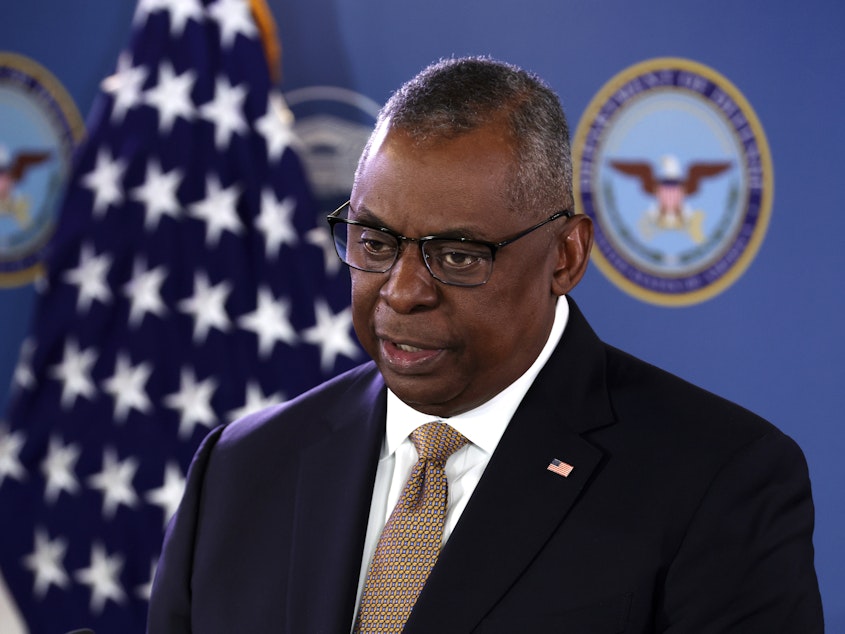U.S. launches airstrikes in Syria after suspected Iranian drone kills a U.S. worker

The U.S. is retaliating after a drone strike killed a U.S. contractor, injured five American service members and wounded one other contractor in Syria, Defense Department said on Thursday.
Intelligence sources found the drone, which struck a Syrian coalition base near Hasakah, was of Iranian origin, Defense Secretary Lloyd Austin said in a statement.
Updated March 24, 2023 at 8:47 AM ET
In response, the U.S. Central Command conducted "precision airstrikes" on targets it believed were connected with Iran's Revolutionary Guard Corps, the Pentagon said.
"As President Biden has made clear, we will take all necessary measures to defend our people and will always respond at a time and place of our choosing," Austin said. "No group will strike our troops with impunity."
Sponsored
Videos shared on social media showed explosions in Deir el-Zour, a Syrian province near the Iraq border that contains oil fields.
The area is controlled by Iran-backed militia groups and Syrian forces, according to the Associated Press, and has seen recent damage from suspected airstrikes by Israel, targeting alleged Iranian supply routes.
The American strikes on Thursday killed 11 people, according to the Syrian Observatory for Human Rights, a group that monitors violence in the region with a network of local sources. Six were Iranian-backed militants in a warehouse in the city. Two were killed on the outskirts of a surrounding town, Al-Mayadeen. Three others were killed in the surrounding desert.
"The number of fatalities is expected to rise, as the strikes left several militiamen injured, some seriously," the group wrote online.
Neither Iran nor Syria appeared to immediately acknowledge the strikes.
Sponsored
The attack and retaliation, though certainly nothing new for the two countries, still pose threats to recent negotiations aimed at de-escalating tensions across the Middle East after decades of conflict. Earlier this month, Iran and Saudi Arabia agreed to restore diplomatic ties in a deal brokered by China, raising questions about whether U.S. influence in the region was on the decline.
The U.S. has had ground troops in northeast Syria since 2015 — when it pledged to fight the rise of ISIS — a key turning point in the wider fallout from the 2011 Arab Spring protests that toppled governments across the Middle East.
Part of that fallout has morphed into a wider proxy conflict in Syria and the surrounding region, with Iran and the U.S. on opposing sides.
Austin said that Thursday's retaliatory airstrikes were not just a response to the most recent drone strike, but also to a "series of recent attacks against coalition forces in Syria."
Iran's Revolutionary Guard has launched an estimated 78 attacks on U.S. forces in Syria since January 2021, U.S. Army General Michael "Erik" Kurilla, who heads Central Command, told the U.S. House Armed Services Committee on Thursday.
Sponsored
The U.S. Central Command, which was formed in 1983 to monitor Iranian expansion, has raised alarm about the expansion of the Revolutionary Guard's military strength.
In written comments to the committee, Kurilla said that deterring Iran is "arguably more urgent than at any time in CENTCOM's history" as the Revolutionary Guard increasingly relies on violent proxy groups to "spread chaos throughout the region."
"Iran possesses the largest and most diverse missile arsenal in the Middle East," Kurilla said. "Even more concerning, Iran has advanced its nuclear program such that Tehran can now produce sufficient fissile material for a nuclear weapon in less than 14 days.
Talks about reviving the 2015 Iran Nuclear Agreement continue to stall.
In a statement following Thursday's airstrikes, Kurilla said the Army was "postured for scalable options in the face of any additional Iranian attacks."
Sponsored
"We will always take all necessary measures to defend our people," he wrote.
This is a developing story. Check back for updates.
NPR's Peter Kenyon contributing reporting. [Copyright 2023 NPR]
